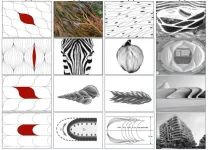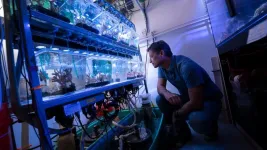(Press-News.org) East Hanover, NJ – September 10, 2024 – Kessler Foundation researchers have published a novel study exploring the effects of delayed feedback on learning in individuals with moderate-to-severe traumatic brain injury (TBI). The article, “Bypassing Striatal Learning Mechanisms Using Delayed Feedback to Circumvent Learning Deficits in Traumatic Brain Injury” (Doi: 10.1097/HTR.0000000000000947), was published online ahead of print on July 24, 2024, in The Journal of Head Trauma Rehabilitation.
The goal of this study was to assess the effects of delayed vs. immediate performance feedback on learning in individuals with TBI and to examine the associated brain networks. The findings revealed that delayed feedback led to better learning performance compared to immediate feedback or no feedback at all. This finding also suggests that delayed feedback may engage brain regions responsible for memory retrieval and confidence.
Foundation authors from the Center for Traumatic Brain Injury Research include Ekaterina Dobryakova, PhD, Tien T Tong, PhD, Olesya Iosipchuk, Anthony Lequerica, PhD, Veronica Schneider, Nancy Chiaravalloti, PhD, joined by Joshua Sandry, PhD, Psychology Department, Montclair State University.
“The observed results might be explained by delayed feedback processing circumventing the striatal dopaminergic regions of the brain responsible for learning from immediate feedback that are impaired in TBI,” said lead author Dr. Dobryakova, assistant director, Neuroscience Research at the Foundation. The study also showed that participants had higher confidence in their learning performance during delayed feedback trials, supported by increased brain activity in the superior parietal and angular gyrus—areas linked to successful memory retrieval and higher memory confidence.
Twenty-eight participants with moderate-to-severe TBI participated in a paired-associate word learning task while undergoing magnetic resonance imaging (MRI). Feedback was presented either immediately, after a delay, or not at all, with behavioral and brain imaging data revealing the advantages of delayed feedback. The main measures included learning performance accuracy, confidence ratings, a post-task questionnaire, and blood oxygen level-dependent signal.
“While the majority of existing studies have focused on immediate feedback, the impact of delayed feedback on learning is understudied. Prior research has demonstrated that learning from immediate and delayed feedback employed distinct brain regions in healthy individuals,” explained Dr. Dobryakova. “Our study suggests that, in individuals with TBI, delayed feedback may be a valuable tool for improving learning outcomes by engaging brain regions associated with memory retrieval and confidence, thereby bypassing the impaired immediate feedback processing pathways.”
This research was supported by This work was supported by The New Jersey Commission on Brain Injury Research [grant number CBIR17PIL022).
About Kessler Foundation
Kessler Foundation, a major nonprofit organization in the field of disability, is a global leader in rehabilitation research. Our scientists seek to improve cognition, mobility, and long-term outcomes, including employment, for adults and children with neurological and developmental disabilities of the brain and spinal cord including traumatic brain injury, spinal cord injury, stroke, multiple sclerosis, and autism. Kessler Foundation also leads the nation in funding innovative programs that expand opportunities for employment for people with disabilities. For more information, visit KesslerFoundation.org.
Press Contact at Kessler Foundation:
Deborah Hauss, DHauss@kesslerfoundation.org
Stay Connected with Kessler Foundation
X (formerly known as Twitter) | Facebook | YouTube | Instagram | SoundCloud
END
Study indicates delayed feedback enhances learning performance in individuals with traumatic brain injury
Delayed feedback may engage brain regions responsible for memory retrieval and confidence
2024-09-10
ELSE PRESS RELEASES FROM THIS DATE:
PLOS and DTH-Lab partner to increase youth participation in science
2024-09-10
San Francisco, California, United States - The Public Library of Science (PLOS) and the Digital Transformations for Health Lab (DTH-Lab) today announced a strategic partnership between the organizations to increase youth participation in science to include mentorship opportunities, amplifying youth voices in scientific publishing and building a body of research in digital health citizenship with a mini-collection.
“This strategic partnership with DTH-Lab will ensure that youth is empowered ...
What’s really ‘fueling’ harmful algae in Florida’s lake Okeechobee?
2024-09-10
Lake Okeechobee is the largest lake in Florida and the second largest in the Southeastern United States. Over the past two decades, blooms of blue-green algae (Microcystis) have emerged in the lake and have been flushed into nearby urban estuaries, causing serious environmental and public health issues.
Excess nutrients from industries, agriculture and urban development – particularly nitrogen and phosphorus – are well-known causes of harmful algal blooms worldwide. Historically, Lake Okeechobee has only been considered to be impaired for phosphorus, ...
Soft cells: Rounded tile shapes echo those found in nature
2024-09-10
Tiles that fill two- and three-dimensional spaces with no gaps—including triangles, squares, hexagons, cubes, and other polyhedra—are typically designed with sharp corners and flat faces (straight edges). Gábor Domokos and colleagues explore soft and curved two- and three-dimensional tiles that completely fill space with a minimal number of sharp corners, which they term “soft cells.” The authors demonstrate how to soften polyhedral tiles by systematically deforming edges. The resulting shapes echo those found in nature, including river estuaries, zebra stripes, muscle tissue, and the chambers of seashells, including the Nautilus. Biological structures ...
Unravel Biosciences and SynGAP Research Fund (SRF) Announce clinical research to accelerate new and repurposed therapies for SYNGAP1-related disorders
2024-09-10
Mill Valley, CA – September 10, 2024 – The SynGAP Research Fund 501(c)(3) announced a collaboration with Unravel Biosciences, Inc., an AI-enabled therapeutics company, to initiate a clinical study aimed at generating primary clinical data, uncovering novel therapeutic targets, repurposing existing drugs, and stratifying SYNGAP1-Related Disorders (SRD) patients into subgroups based on their predicted response to selected drugs. This collaboration will utilize Unravel’s rareSHIFT™ discovery services and BioNAV™ AI platform to advance the development of targeted therapies for SRD.
As part of this ...
The Paul G. Allen Frontiers Group announces Allen Discovery Center for Neurobiology in Changing Environments
2024-09-10
SEATTLE, WASH.—September 10, 2024—Climate change is rapidly reshaping our oceans, stressing the nervous systems of marine organisms that have evolved over millions of years. Scientists now face a critical question: How do these environmental shifts affect these animals’ ability to sense and respond to their changing world?
To address this pressing issue, the Paul G. Allen Frontiers Group, a division of the Allen Institute, today announced the launch of the Allen Discovery Center (ADC) for Neurobiology in Changing Environments. This initiative, based at Scripps Institution of Oceanography at the University of California ...
Clinical hypnosis vs. cognitive behavioral therapy: What's better for managing hot flashes?
2024-09-10
CLEVELAND, Ohio (Sept 10, 2024)–Nonhormone options for hot flashes and other menopause symptoms are growing in popularity, especially for women who cannot take hormones due to health complications. Cognitive behavioral therapy and clinical hypnosis are common nonhormone treatment options. According to a new scoping review, however, one is more effective than the other. Results of the scoping review will be presented at the 2024 Annual Meeting of The Menopause Society in Chicago September 10-14.
Recognizing that a percentage of menopausal women cannot take hormone therapy either because of health restrictions, such as being a breast ...
Exploring the possible link between PTSD and early menopause
2024-09-10
CLEVELAND, Ohio (Sept 10, 2024) – Post-traumatic stress disorder (PTSD) can cause an array of adverse mental health effects, but physical side effects are also common. A new study conducted with Persian Gulf War female military personnel demonstrates that women with probable PTSD are twice as likely to experience early menopause and related health consequences. Results of the study will be presented at the 2024 Annual Meeting of The Menopause Society in Chicago September 10-14.
Commonly reported symptoms of PTSD include anger outbursts, anxiety, and difficulty concentrating and sleeping. Physically, PTSD can also be responsible for serious ...
Is hormone therapy good for heart health?
2024-09-10
CLEVELAND, Ohio (Sept 10, 2024)–Recent studies show that women can experience bothersome menopause symptoms, like hot flashes, for longer than originally estimated. As a result, more research is focusing on the long-term effects of hormone therapy. A new study suggests certain estrogen-based hormone therapies have favorable long-term effects on the risk of heart disease. Results of the study will be presented at the 2024 Annual Meeting of The Menopause Society in Chicago September 10-14.
Hormone therapy has been the subject of intense debate for more ...
Mass production of metal nanowires possible by breakthrough technique
2024-09-10
A group from Nagoya University in Japan has created a new technique for growing the tiny metal nanowires (NWs) that are expected to be used in next-generation electronics. Their results suggest a way to mass produce pure metal NWs, which has until now limited their use. The new technique promises to enhance the efficiency of electronics production, including circuitry, LEDs, and solar cells. The study was published in Science.
Mass production of NWs has been challenging because of the difficulties of scaling production while maintaining quality and ...
Methane emissions are rising faster than ever
2024-09-10
The world has not hit the brakes on methane emissions, a powerful driver of climate change. More than 150 nations have pledged to slash by 30% this decade under a global methane pledge, but new research shows global methane emissions over the past five years have risen faster than ever.
The trend “cannot continue if we are to maintain a habitable climate,” the researchers write in a Sept. 10 perspective article in Environmental Research Letters published alongside data in Earth System Science Data. Both papers are the work of the Global ...
LAST 30 PRESS RELEASES:
The long standing commercialization challenge of lithium batteries, often called the dream battery, has been solved.
New method to remove toxic PFAS chemicals from water
The nanozymes hypothesis of the origin of life (on Earth) proposed
Microalgae-derived biochar enables fast, low-cost detection of hydrogen peroxide
Researchers highlight promise of biochar composites for sustainable 3D printing
Machine learning helps design low-cost biochar to fight phosphorus pollution in lakes
Urine tests confirm alcohol consumption in wild African chimpanzees
Barshop Institute to receive up to $38 million from ARPA-H, anchoring UT San Antonio as a national leader in aging and healthy longevity science
Anion-cation synergistic additives solve the "performance triangle" problem in zinc-iodine batteries
Ancient diets reveal surprising survival strategies in prehistoric Poland
Pre-pregnancy parental overweight/obesity linked to next generation’s heightened fatty liver disease risk
Obstructive sleep apnoea may cost UK + US economies billions in lost productivity
Guidelines set new playbook for pediatric clinical trial reporting
Adolescent cannabis use may follow the same pattern as alcohol use
Lifespan-extending treatments increase variation in age at time of death
From ancient myths to ‘Indo-manga’: Artists in the Global South are reframing the comic
Putting some ‘muscle’ into material design
House fires release harmful compounds into the air
Novel structural insights into Phytophthora effectors challenge long-held assumptions in plant pathology
Q&A: Researchers discuss potential solutions for the feedback loop affecting scientific publishing
A new ecological model highlights how fluctuating environments push microbes to work together
Chapman University researcher warns of structural risks at Grand Renaissance Dam putting property and lives in danger
Courtship is complicated, even in fruit flies
Columbia announces ARPA-H contract to advance science of healthy aging
New NYUAD study reveals hidden stress facing coral reef fish in the Arabian Gulf
36 months later: Distance learning in the wake of COVID-19
Blaming beavers for flood damage is bad policy and bad science, Concordia research shows
The new ‘forever’ contaminant? SFU study raises alarm on marine fiberglass pollution
Shorter early-life telomere length as a predictor of survival
Why do female caribou have antlers?
[Press-News.org] Study indicates delayed feedback enhances learning performance in individuals with traumatic brain injuryDelayed feedback may engage brain regions responsible for memory retrieval and confidence







